|
|
|
Sort Order |
|
|
|
Items / Page
|
|
|
|
|
|
|
| Srl | Item |
| 1 |
ID:
089370
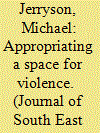

|
|
|
|
|
| Publication |
2009.
|
| Summary/Abstract |
In southern Thailand, monasteries once served as focal points for different communal identities to negotiate shared space and, with it, shared identities. However, since martial law was declared in 2004, Muslims in southern Thailand do not frequent monasteries. Instead, soldiers and police occupy monastery buildings and protect the perimeters from attacks. In addition, there are now military monks, soldiers who are simultaneously ordained monks, who work to protect the monasteries. This article argues that the Thai State's militarisation of monasteries and the role of Buddhist monks fuel a religious dimension to the ongoing civil war in southern Thailand.
|
|
|
|
|
|
|
|
|
|
|
|
|
|
|
|
| 2 |
ID:
096570
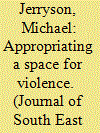

|
|
|
|
|
| Publication |
2009.
|
| Summary/Abstract |
In southern Thailand, monasteries once served as focal points for different communal identities to negotiate shared space and, with it, shared identities. However, since martial law was declared in 2004, Muslims in southern Thailand do not frequent monasteries. Instead, soldiers and police occupy monastery buildings and protect the perimeters from attacks. In addition, there are now military monks, soldiers who are simultaneously ordained monks, who work to protect the monasteries. This article argues that the Thai State's militarisation of monasteries and the role of Buddhist monks fuel a religious dimension to the ongoing civil war in southern Thailand.
|
|
|
|
|
|
|
|
|
|
|
|
|
|
|
|
| 3 |
ID:
096577


|
|
|
|
|
| Publication |
2009.
|
| Summary/Abstract |
This article examines changes within the Dutch civilising mission ideology after the decline of the Ethical Policy. Support of pure science, scientific knowledge that supposedly transcended ideology and politics, allowed the colonial administration to continue to project their rule as decent and moral, even as conflict and repression dominated colonial politics in the 1920s. The argument starts with the construction of pure science after 1910, under the care of J.C. Koningsberger, out of the research traditions at the Department of Agriculture. It next examines the creation of institutions and agendas of pure science. And finally it analyses the absorption of pure science into the civilising mission of the 1920s. It concludes with a discussion of what this means for historical evaluations of the Dutch colonial project.
|
|
|
|
|
|
|
|
|
|
|
|
|
|
|
|
| 4 |
ID:
089375


|
|
|
|
|
| Publication |
2009.
|
| Summary/Abstract |
This article examines changes within the Dutch civilising mission ideology after the decline of the Ethical Policy. Support of pure science, scientific knowledge that supposedly transcended ideology and politics, allowed the colonial administration to continue to project their rule as decent and moral, even as conflict and repression dominated colonial politics in the 1920s. The argument starts with the construction of pure science after 1910, under the care of J.C. Koningsberger, out of the research traditions at the Department of Agriculture. It next examines the creation of institutions and agendas of pure science. And finally it analyses the absorption of pure science into the civilising mission of the 1920s. It concludes with a discussion of what this means for historical evaluations of the Dutch colonial project.
|
|
|
|
|
|
|
|
|
|
|
|
|
|
|
|
| 5 |
ID:
096575
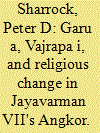

|
|
|
|
|
| Publication |
2009.
|
| Summary/Abstract |
Ancient Cambodia turned definitively to state Buddhism under King Jayavarman VII at the end of the twelfth century, after four centuries of state Saivism. This paper explores the motivation behind this momentous change and tries to establish the means by which it was achieved. It uncovers signs of a very large, politically motivated campaign of tantric Buddhist initiations that required a significant overhaul of the king's temples and the creation of a new series of sacred icons.
|
|
|
|
|
|
|
|
|
|
|
|
|
|
|
|
| 6 |
ID:
089373


|
|
|
|
|
| Publication |
2009.
|
| Summary/Abstract |
The Thai literary canon identifies three novels published around 1929 as the first authentic Thai novels. This pronouncement elides the importance of novels published before that date. Because literary scholars focus their teaching, writing and research on novels defined by the canon, lesser-known works have been overlooked or ignored. The current Thai canon obfuscates literary transmission, in particular, the significance of pre-1929 compositions. In this essay, three novels - Mae Wan's Khwam phayabat (1902), Khru Liam's Khwam mai phayabat (1915) and Nang neramid (1916) - are selected to show that these early compositions represent important genres of novels that should be considered for the canon, even though they are seen as less than 'authentic' Thai. This paper examines the three novels through the lens of critical, translation and postcolonial theories. It is a study of vernacularisation, authenticity, hybridity, mimesis, and bi-culturalism.
|
|
|
|
|
|
|
|
|
|
|
|
|
|
|
|
| 7 |
ID:
089371
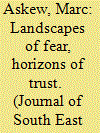

|
|
|
|
|
| Publication |
2009.
|
| Summary/Abstract |
Thai Buddhist and Malay Muslim neighbours in Thailand's Muslim-majority deep south face the challenge of managing everyday life in the midst of an enigmatic insurgency where both ethno-religious groups are victims of violence, but where the assailants are difficult to identify. This ethnographically-focused paper examines horizons of trust and suspicion as villagers confront threats to their safety, negotiate state authorities and encounter broader narratives about identity, allegiance and enemies. Although fear and suspicion sparked by the current violence have generated Buddhist-Muslim tensions in localities, neighbourhoods and village leaders also actively resist the multiple threats to their relationships and to inter-ethnic coexistence.
|
|
|
|
|
|
|
|
|
|
|
|
|
|
|
|
| 8 |
ID:
096571


|
|
|
|
|
| Publication |
2009.
|
| Summary/Abstract |
Thai Buddhist and Malay Muslim neighbours in Thailand's Muslim-majority deep south face the challenge of managing everyday life in the midst of an enigmatic insurgency where both ethno-religious groups are victims of violence, but where the assailants are difficult to identify. This ethnographically-focused paper examines horizons of trust and suspicion as villagers confront threats to their safety, negotiate state authorities and encounter broader narratives about identity, allegiance and enemies. Although fear and suspicion sparked by the current violence have generated Buddhist-Muslim tensions in localities, neighbourhoods and village leaders also actively resist the multiple threats to their relationships and to inter-ethnic coexistence.
|
|
|
|
|
|
|
|
|
|
|
|
|
|
|
|
| 9 |
ID:
096574
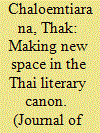

|
|
|
|
|
| Publication |
2009.
|
| Summary/Abstract |
The Thai literary canon identifies three novels published around 1929 as the first authentic Thai novels. This pronouncement elides the importance of novels published before that date. Because literary scholars focus their teaching, writing and research on novels defined by the canon, lesser-known works have been overlooked or ignored. The current Thai canon obfuscates literary transmission, in particular, the significance of pre-1929 compositions. In this essay, three novels - Mae Wan's Khwam phayabat (1902), Khru Liam's Khwam mai phayabat (1915) and Nang neramid (1916) - are selected to show that these early compositions represent important genres of novels that should be considered for the canon, even though they are seen as less than 'authentic' Thai. This paper examines the three novels through the lens of critical, translation and postcolonial theories. It is a study of vernacularisation, authenticity, hybridity, mimesis, and bi-culturalism.
|
|
|
|
|
|
|
|
|
|
|
|
|
|
|
|
| 10 |
ID:
089372


|
|
|
|
|
| Publication |
2009.
|
| Summary/Abstract |
The Thai literary canon identifies three novels published around 1929 as the first authentic Thai novels. This pronouncement elides the importance of novels published before that date. Because literary scholars focus their teaching, writing and research on novels defined by the canon, lesser-known works have been overlooked or ignored. The current Thai canon obfuscates literary transmission, in particular, the significance of pre-1929 compositions. In this essay, three novels - Mae Wan's Khwam phayabat (1902), Khru Liam's Khwam mai phayabat (1915) and Nang neramid (1916) - are selected to show that these early compositions represent important genres of novels that should be considered for the canon, even though they are seen as less than 'authentic' Thai. This paper examines the three novels through the lens of critical, translation and postcolonial theories. It is a study of vernacularisation, authenticity, hybridity, mimesis, and bi-culturalism.
|
|
|
|
|
|
|
|
|
|
|
|
|
|
|
|
| 11 |
ID:
089369
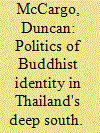

|
|
|
|
|
| Publication |
2009.
|
| Summary/Abstract |
This article sets out to criticise arguments by scholars such as Charles Keyes and Donald Swearer, who have framed their readings of Thai Buddhism through a lens of 'civic' or 'civil' religion. Drawing on fieldwork conducted in the southern border provinces, the paper argues that religious tolerance is declining in Thailand, and that anti-Muslim fears and sentiments are widespread among Buddhists. Some southern Buddhists are now arming themselves, and are creating militia groups in the face of growing communal violence. In the rest of Thailand, hostility towards Muslims, coupled with growing Buddhist chauvinism, is being fuelled by developments in the south.
|
|
|
|
|
|
|
|
|
|
|
|
|
|
|
|
| 12 |
ID:
096568
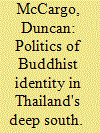

|
|
|
|
|
| Publication |
2009.
|
| Summary/Abstract |
This article sets out to criticise arguments by scholars such as Charles Keyes and Donald Swearer, who have framed their readings of Thai Buddhism through a lens of 'civic' or 'civil' religion. Drawing on fieldwork conducted in the southern border provinces, the paper argues that religious tolerance is declining in Thailand, and that anti-Muslim fears and sentiments are widespread among Buddhists. Some southern Buddhists are now arming themselves, and are creating militia groups in the face of growing communal violence. In the rest of Thailand, hostility towards Muslims, coupled with growing Buddhist chauvinism, is being fuelled by developments in the south.
|
|
|
|
|
|
|
|
|
|
|
|
|
|
|
|
| 13 |
ID:
096576


|
|
|
|
|
| Publication |
2009.
|
| Summary/Abstract |
What were the indigenous agricultural and population patterns in peninsular Malaysia's southern lowlands? What factors produced these patterns? Based on our analysis of ethnographic and historical evidence, as well as aerial photographs taken in 1948 in the Tasek Bera and Sungai Bera watersheds, the Semelai, an Orang Asli group, had a robust and productive subsistence agricultural system emphasising rice but insured by cassava. These photographs, from the P.D.R. Williams-Hunt Collection, provide an unusual record of Semelai agriculture prior to settlement in 1954 and contribute to our knowledge of indigenous economic patterns in the southern lowlands, which have received little ethnographic attention.
|
|
|
|
|
|
|
|
|
|
|
|
|
|
|
|
| 14 |
ID:
089374
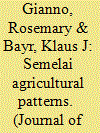

|
|
|
|
|
| Publication |
2009.
|
| Summary/Abstract |
What were the indigenous agricultural and population patterns in peninsular Malaysia's southern lowlands? What factors produced these patterns? Based on our analysis of ethnographic and historical evidence, as well as aerial photographs taken in 1948 in the Tasek Bera and Sungai Bera watersheds, the Semelai, an Orang Asli group, had a robust and productive subsistence agricultural system emphasising rice but insured by cassava. These photographs, from the P.D.R. Williams-Hunt Collection, provide an unusual record of Semelai agriculture prior to settlement in 1954 and contribute to our knowledge of indigenous economic patterns in the southern lowlands, which have received little ethnographic attention.
|
|
|
|
|
|
|
|
|
|
|
|
|
|
|
|
| 15 |
ID:
096566
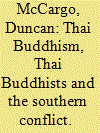

|
|
|
|
|
| Publication |
2009.
|
| Summary/Abstract |
Thailand's 'southern border provinces' of Pattani, Yala and Narathiwat - along with four districts of neighbouring Songkhla - are the site of fiery political violence characterised by daily killings. The area was historically a Malay sultanate, and was only loosely under Thai suzerainty until the early twentieth century. During the twentieth century there was periodic resistance to Bangkok's attempts to suppress local identity and to incorporate this largely Malay-speaking, Muslim-majority area into a predominantly Buddhist nation-state. This resistance proved most intense during the 1960s and 1970s, when various armed groups (notably PULO [Patani United Liberation Organization] and BRN [Barisan Revolusi Nasional]) waged war on the Thai state, primarily targeting government officials and the security forces. In the early 1980s, the Prem Tinsulanond government brokered a deal with these armed groups and proceeded to co-opt the Malay-Muslim elite. By crafting mutually beneficial governance, security and financial arrangements, the Thai state was able largely to placate local political demands.
|
|
|
|
|
|
|
|
|
|
|
|
|
|
|
|
| 16 |
ID:
089368
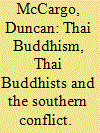

|
|
|
|
|
| Publication |
2009.
|
| Summary/Abstract |
Thailand's 'southern border provinces' of Pattani, Yala and Narathiwat - along with four districts of neighbouring Songkhla - are the site of fiery political violence characterised by daily killings. The area was historically a Malay sultanate, and was only loosely under Thai suzerainty until the early twentieth century. During the twentieth century there was periodic resistance to Bangkok's attempts to suppress local identity and to incorporate this largely Malay-speaking, Muslim-majority area into a predominantly Buddhist nation-state. This resistance proved most intense during the 1960s and 1970s, when various armed groups (notably PULO [Patani United Liberation Organization] and BRN [Barisan Revolusi Nasional]) waged war on the Thai state, primarily targeting government officials and the security forces. In the early 1980s, the Prem Tinsulanond government brokered a deal with these armed groups and proceeded to co-opt the Malay-Muslim elite. By crafting mutually beneficial governance, security and financial arrangements, the Thai state was able largely to placate local political demands.
|
|
|
|
|
|
|
|
|
|
|
|
|
|
|
|
|
|
|
|
|